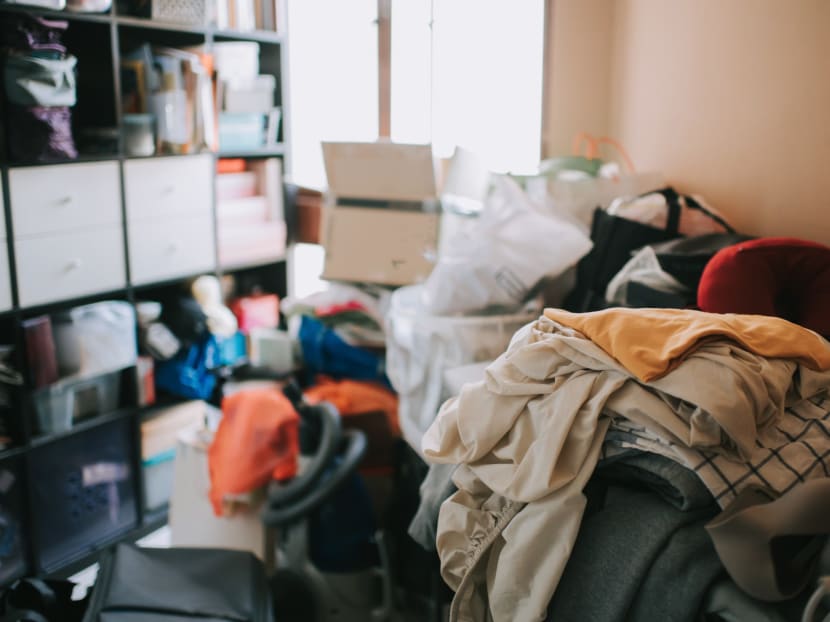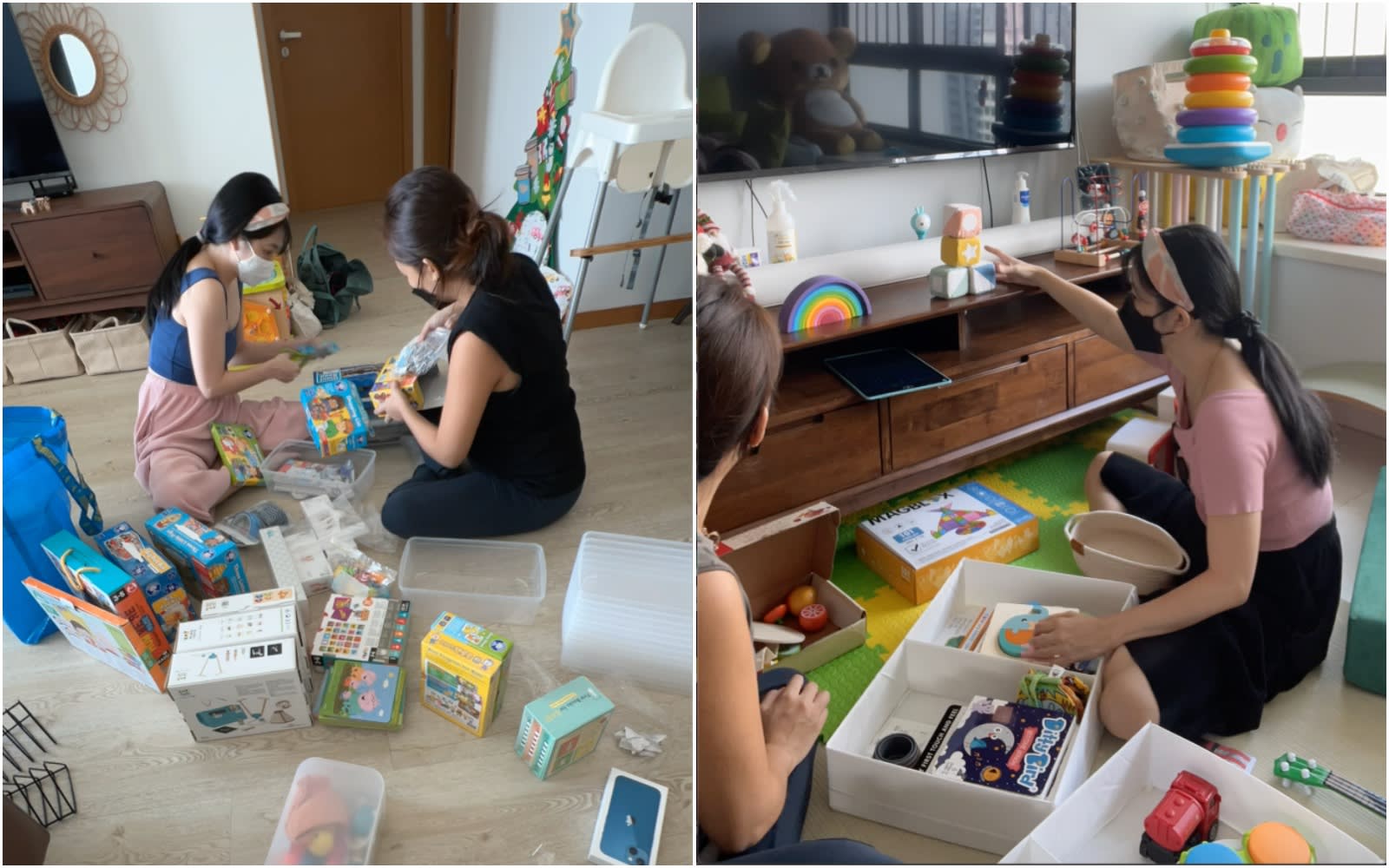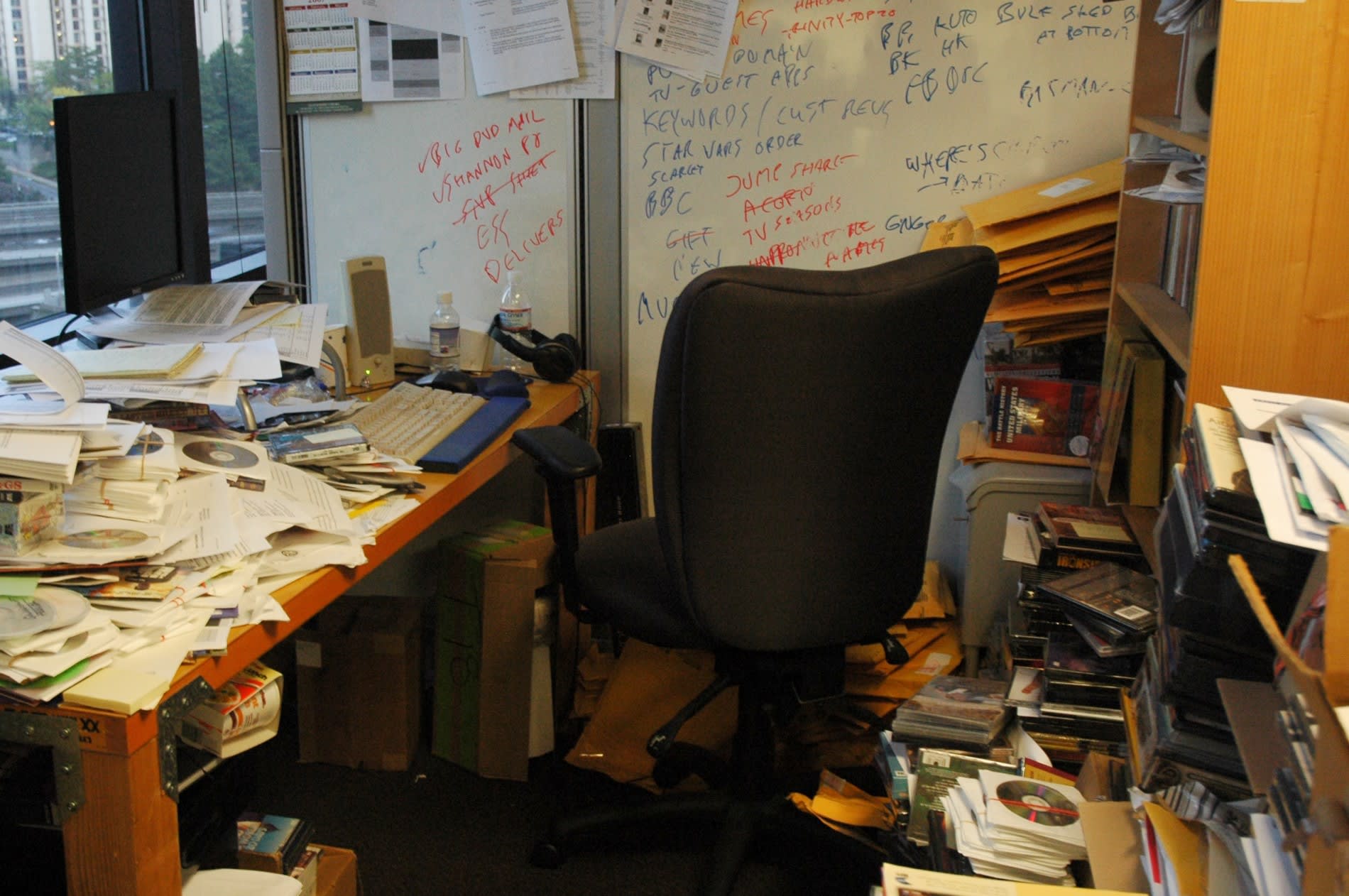Why do we hoard things and when is it a sign of a mental disorder?
SINGAPORE — Expired food items were left forgotten in wardrobes, including chilli sauce. Cardboards and bags stacked from floor to ceiling in a room. Twenty cats living in the space of a small rental flat.

Clothes, bags, boxes and things piled high in a room, with shelving space also packed full of items.
- Research shows that a cluttered environment adversely affects mental well-being, focus and productivity
- A main reason for messy homes is over-consumption and people not being mindful of what they buy, two certified organisational specialists said
- In some cases, severe clutter and disorganisation may be a sign of underlying mental health disorders such as hoarding disorder and schizophrenia
- Experts gave tips on how to start decluttering, but added that these have to go along with behavioural changes and maintenance
SINGAPORE — Expired food items were left forgotten in wardrobes, including chilli sauce. Cardboards and bags stacked from floor to ceiling in a room. Twenty cats living in the space of a small rental flat.
These were among some of the sights in people's homes here that were excessively cluttered and not conducive to healthy and safe living.
A psychiatrist said that in some cases, a disorganised and cluttered home may be a sign of underlying mental health problems.
Although some people may live in cluttered homes, Dr Lim Boon Leng, a psychiatrist at Dr BL Lim Centre for Psychological Wellness, said: “Those with emotional difficulties may neglect their living space.
“The messiness, disorganisation and clutter may be symptoms of underlying mental illness. Attention deficit hyperactivity disorder, hoarding disorder, depression and schizophrenia are often associated with varying degrees of disorganisation.”
Not everyone who lives with some clutter at home is mentally unwell. Accumulating items to some extent is still within the “normal spectrum”, Dr Lim added.
Ms Rae Zhang, for instance, was living with some clutter at home for years.
The 31-year-old, a recently certified organisational specialist, used to have a hectic job in healthcare working as a dietitian.
“In the five to six years that I worked in a hospital, I felt like I had neglected my home. I was organised in my work but not in my home organisation,” she told TODAY.
Half of her dining table, for instance, was buried under items as if it was a “dumping ground” for wallets, handbag, housekeys, letters and such.
Last year, during the Covid-19 pandemic, she finally got round to begin removing clutter at home. It started with her toddler’s room.
“My daughter’s room suddenly ‘lit up’ after that. It looked so nice, so clutter-free. I felt so happy — and I slowly started doing that for the rest of the house,” she recalled.
So inspired by that sense of achievement, Ms Zhang started Orderly last year. Together with a former secondary school friend Vanessa Yip, 32, they offer professional consultation services to people who want to organise homes and corporate spaces.
Since the launch of Orderly last year, Ms Zhang and Ms Yip have encountered a mixed bag of clients looking for help to declutter and organise their homes and offices.
While clearing homes, they have come across plenty of expired food items. One client had five to six complete packets of instant noodles because they forgot they had bought them; others had forgotten stashes of food left around in the bedroom.
“For example, we’ve found chilli sauce in the wardrobe and random things like clothes and a spanner in the kitchen,” Ms Yip said.
At the end of the day, both women wanted to help people maintain organised — and peaceful — spaces.
They took up a remote-learning course to become organisational consultants, certified by Ms Cassandra Aarssen, a professional organiser and author based in Canada.
Ms Zhang said that the definition of clutter can be rather subjective: “What is clutter to one may not be clutter to another.
“Our homes are personal spaces and everyone has varying comfort levels in terms of how organised they would like their homes to be. For example, Vanessa, who has been an organised person since young, may have a lower tolerance level for clutter than I do.”

The pair said that some clients’ homes appear quite organised on first impression but may still want paid help to keep things more orderly so that they feel less stressed.
Some homes thrive on “organised chaos” — where everything looks like a mess but the owners know exactly where to find what they need, they added.
And then, there are homes that are highly cluttered, in complete disarray or excess.
WHY IS A CLUTTERED HOME BAD FOR HEALTH?
Dr Lim the psychiatrist explained that when clutter builds up, people are likely to misplace things, which leads to frustration and reduced productivity when time is spent looking for items.
There is also the cultural aspect of how others may perceive a disorderly home. After all, society has inculcated in people that cleaning, organising and decluttering are virtuous behaviours, Dr Lim said.
“Most of all, living in a messy way often causes inconvenience for other family members. Quarrels and disagreements may ensue and create further stress,” he added.

Although people living in cleaner, tidier homes tend to have higher levels of mental well-being than those living in cluttered homes, it is important to recognise that being obsessively clean and tidy may also be a sign of a mental health problem.
IS YOUR HOME A FIRE HAZARD?
Besides the mental health impact, a cluttered home may also pose physical danger, such as during a fire.
Even though the total number of fire incidents on residential premises dropped by 4.2 per cent last year, fires involving household contents increased by 10.2 per cent to 183 cases. These were figures from the Fire, Emergency Medical Services And Fire Safety Enforcement Statistics 2021.
However, the Singapore Civil Defence Force (SCDF) said that residential fires can occur in both hoarded and non-hoarded units, and they often happen due to human behavioural factors rather than the amount of items stored within homes.
Between 2018 and end-September 2021, SCDF was alerted to nine residential fires that involved hoarding. This accounts for less than 1 per cent of all residential fires.
WHY CLUTTER BUILDS UP
There are several factors why some homes become messy and cluttered.
The main issue would be overconsumption because many Singaporeans are not mindful about what they buy, Ms Zhang said. “It’s a First-World problem.”
Ms Yip said: “Singaporeans, in general, are very blessed and have the means to buy things that are not necessary. Sometimes, we buy in bulk or we are blessed with too many gifts from others but feel guilty about letting go.
“If gifting is your love language, perhaps consider cash gifts or vouchers instead.
“As a receiver (of gifts), you could consider donating excess gifts or even re-gifting them. It’s 2022 — regifting shouldn’t be considered a social faux pas anymore.”
Dr Lim said that many people have picked up the habit of online shopping, particularly during the Covid-19 pandemic.
“It’s easy to buy and have things delivered to us. However, it is harder to dispose of them, particularly big items and also items that may contain flammable components like lithium batteries,” he added.
Lack of space planning and discipline to return items at home to the shelving or storage space where they belong compound the clutter issue.
“This leads to a vicious circle of not being able to find something and hence, buying multiples (of what you already have),” Ms Yip said.
Sometimes, there may be unforeseen circumstances, for example, having to share living space with other people or more people, such as in a rental home.
HOW TO GET STARTED TO DECLUTTER YOUR HOME
1. Do it immediately
Do not procrastinate. Once you feel that “tingling” urge to declutter, act on it immediately and keep going to avoid being distracted by other tasks, Ms Rae Zhang and Ms Vanessa Yip, certified organisational specialists from Orderly, said.
2. Start small
There is no need to be overly ambitious and declutter a large area; even something small such as your wallet, handbag, a small section of your desk or cabinet is a good start.
“Some may prefer to declutter for a short 15 to 30 minutes daily while others may prefer to dedicate an entire day. It’s really up to the individual’s preference and how much time they have,” Ms Yip said.
3. Psyche yourself up
Ms Yip suggested giving yourself a pep talk, listening to some upbeat music or getting a family member or friend to give moral support and hold you accountable to your decluttering project.
4. Manage your own expectations
Psychiatrist Lim Boon Leng said that organising one’s living arrangement requires constant maintenance. People should also understand that there is no need to be “perfectly organised”.
“It is always work in progress. As such, making sure you factor in time in your schedule to do so is important. It is also a lot easier to stay organised when you tidy up a little here and there day to day, rather than having to clear up a big accumulated stress,” Dr Lim added.
“Although it is difficult to have a clear marker of how much decluttering is good enough, as long as your living arrangements are organised to the extent that it does not affect your daily functioning or that of your loved ones, it should be sufficient.”
WHEN HOARDING BECOMES A SERIOUS PROBLEM
When it comes to severe clutter or hoarding, Ms Zhang and Ms Yip from Orderly do not take on such cases. This is because they are not trained to do so.
Such cases are also complex and would require professional mental health and social support, they said.
Ms Sharon Ng, head of Reach Family Service, which serves vulnerable families and individuals living in Bishan and Sin Ming housing estates, said that people who hoard excessively have persistent difficulty in parting with the items, regardless of the items’ value.
“They keep the item because it gives them a sense of security and they have an emotional attachment to it. If you ask them to part with the items, they can get quite distressed,” she said.
Ms Ng and her colleagues see around 15 to 20 such hoarding cases at any given time. A study in Singapore found that around a third of hoarding cases may have underlying mental health issues, she said.
Among the cases they have encountered, hoarding of paper-related items, such as newspaper and cardboard, are common. So are food remnants stashed around in the rooms in plastic or styrofoam boxes.
Sometimes, the items are stacked from the floor to ceiling.
“Usually, the cases surface when neighbours complain, especially when the clutter or items affect them. Most people (who accumulate the items) won’t seek help on their own because these items are like their treasures.Ms Sharon Ng, head of Reach Family Service”
Some people may also hoard animals, such as one 30-year-old woman whom Ms Ng encountered. The woman was living in a two-room rental flat with about 20 cats.
“Usually, the cases surface when neighbours complain, especially when the clutter or items affect them. Most people (who accumulate the items) won’t seek help on their own because these items are like their treasures,” Ms Ng added.
Due to the complexity of hoarding cases, Ms Ng said that a multi-agency approach is required.
Officers managing such cases are guided by the Hoarding Management Framework to provide coordinated support to address each case individually.
Ms Ng said that the framework was developed with different partners, with the Ministry of National Development – Municipal Service Office as the overall coordinating agency.
Other partners include:
- The Housing and Development Board, Agency for Integrated Care and Institute of Mental Health for professional assessment and treatment of any underlying mental illness
- The National Environment Agency for public health
- SCDF for fire hazards
- The Ministry of Social and Family Development, where social workers from Family Service Centres work with different partners, as well as clients who hoard and their families, to provide a safe environment for the hoarder and their neighbours
“It involves an intensive and long-term process of building a relationship with the person to counsel and support them during the decluttering process,” Ms Ng added.
“Even if we successfully get the person to remove the items, the clutter may return two to three years later.”
In cases where the hoarding behaviour is a sign of an underlying mental health disorder, the approach would be to treat the condition, Dr Lim said.
“For hoarding disorder per se, cognitive behavioural therapy with a psychologist is the first line of treatment, followed by addition of medications if necessary,” he added.
WHERE TO SEEK HELP
For people who are generally disorganised to begin with and do not know where to start after accumulating years — or decades — of clutter, Dr Lim said that engaging a one-time decluttering or cleaning service may be useful if the service also includes advice on how to arrange, categorise and discard items.
“Start small,” he suggested. “Many people have an all-or-nothing approach with clutter. They want to make big changes but are daunted because big changes are difficult to make.
“Pick the low-lying fruits, so to speak, to improve motivation and confidence, and it will get easier with time.”

For those who still have clutter problems despite trying, Dr Lim suggested seeking professional mental health support since there may be underlying issues.
Ms Zhang and Ms Yip believe that with the appropriate guidance, it is possible to help a disorganised person to become more organised.
Decluttering is the first step but ultimately, what is important is to have behavioural changes such as putting things back to where they belong and not buying things at every whim.
“If you don’t buy many things (that you don’t need), you won’t have to declutter regularly,” Ms Yip said.









